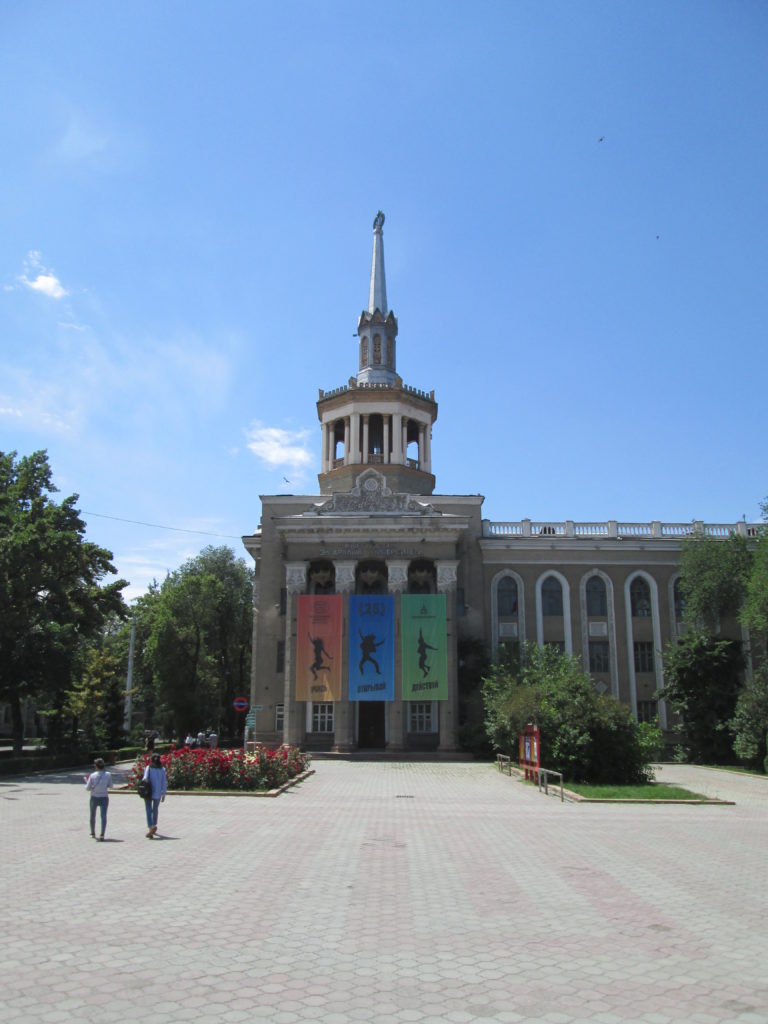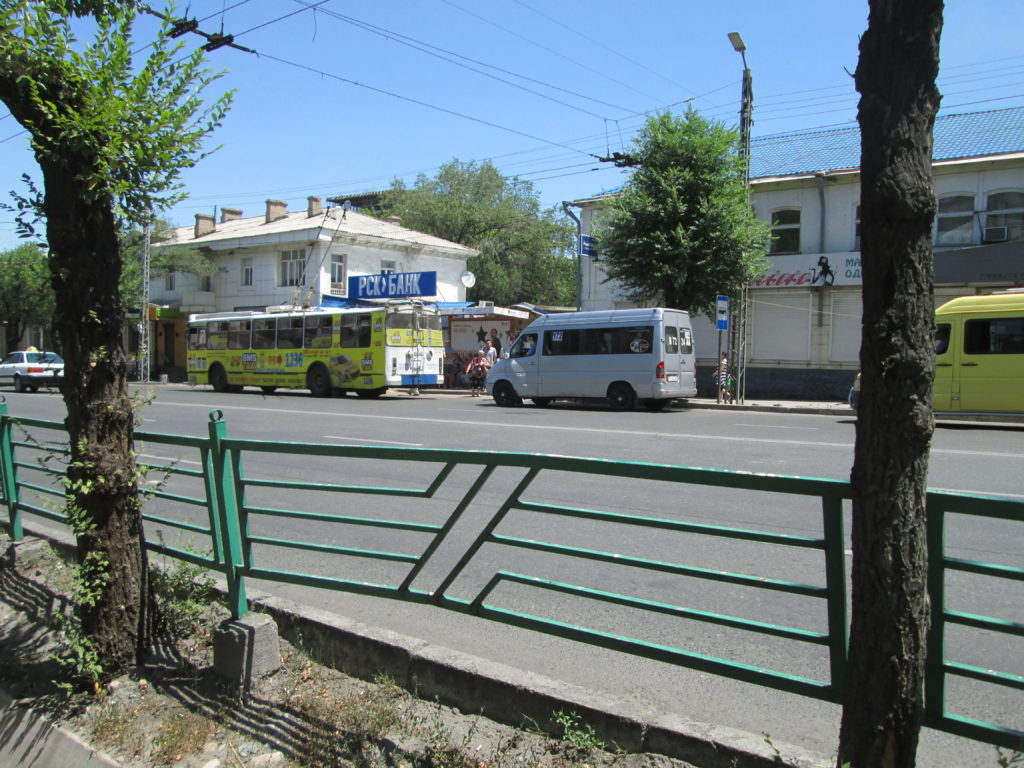The city of Bishkek, Kyrgyzstan (where I am living right now) is located in the timezone exactly 12 hours ahead of the Mountain Time Zone in America; Kyrgyzstan is literally on the other side of the world from America! Being so far from America, it was interesting to see how much and also how little American culture effects Kyrgyz culture, and what native Kyrgyz people think about America.
Kyrgyzstan is located on the Silk Road and therefore its history ties it closely to China as well as Turkey — the Near and the Far East. My host family religiously watches a Turkish drama, and many of the college students that I’ve met here study either Chinese or Korean, even the ones that are working as our conversation partners. English doesn’t seem high on their list of languages to learn, although it is on their list and many know basic English phrases. We Americans always hear about how immigrants come to America because it is a land of opportunity, but Kyrgyz people would rather move to China, Korea, Turkey, or Russia. Of course, that is not to say that people in Kyrgyzstan do not have any opinions on America, but it was interesting to be in a place where America was not a big deal. In order to learn more about America, I engaged two of my Kyrgyz friends in conversations on America, and then one of my host family’s relatives brought up America himself and we talked on that subject. What I learned is related below.

America: The Land of Media
The first conversation that I had was with a young Kyrgyz man who enjoys anime and Korean dramas, as well as American TV shows and American music. He is interested in how there is so much variety and difference in America, exemplified by the different states. His favorite thing about America is Hollywood, he said, because he loves American movies.

Speaking with him was not difficult because he spoke clearly and did not mumble, as many Kyrgyz and Russian speakers are prone to. Also, conversing about America is simple because there are many loan words in Russian from English that relate to the media, which was the main subject of our conversation (example: фильм = film = film). One thing that was surprisingly hard was understanding the names of the TV shows and movies that he had watched: either the title was completely different in Russian, was directly translated from Russian into English, or the English title was spoken with such a thick Russian accent that I had trouble making it out. The everyday vocabulary that we learn in class does not often include the sorts of words that make up movie and TV show titles (example: “The Avengers” = “Мстители” (Mstiteli)), and the complex and ambiguous meaning of a title is also difficult to understand in translation (for example: “Ocean’s 8” becomes “Eight Friends of Ocean” = Восемь подруг Оушена (Vosem’ podrug Oshyena)). To get around this issue, he would list off the names of the main characters in that show and then I would just have to decipher his accent.

America: The Land of Freedom
The second conversation focused more on the freedom in America, but not so much political freedom as social freedom, especially freedom from parents. She focused on how, in America, one is free to choose one’s own path, separate from the desires of their parents, whereas in Kyrgyzstan one is expected to obey one’s parents and parents are very involved in their children’s lives even after their children become adults. According to her, Americans are more free to choose their own path because they have such a wide variety of universities they can be accepted into and a wide choice of programs within that university to pick from, whereas in Kyrgyzstan there are only a handful of universities with only a few majors (specialties).

She also spoke about how people in America are more open, about their beliefs, opinions, emotions, and in their clothing style. She said that Americans are not shy. By the way, although the Kyrgyz dress in Western clothing styles, it is almost equally divided between European styles and Korean styles: their “American clothing style” is filtered through Europe and Korea before coming to their stores. Only older men and women still dress traditionally, and then only occasionally.
This conversation was both easier and harder than the conversation with the young Kyrgyz man. I understood less of the vocabulary that she was using, but she also knew more English. Therefore, when the conversation came to a halt over my inability to understand a certain word, she could give the English translation and then continue on in Russian. For example, I did not understand the word that she used to mean ‘not shy’ when she said that Americans are ‘not shy’, so she said to me, “Not shy.” I’ve noticed that it’s often hard for me to learn new vocabulary when it is used in an interesting conversation: I do not remember the word that she used to mean ‘not shy’ even though she used it several times in the conversation and, at that time, I was able to recognize it. It is as though I learned to recognize it but not to use it myself. Now, I try to make a point of using a new word myself in the same conversation that I learned it in in order to improve my retention. I have also noticed that I have become better at making educated guesses from context clues. In this conversation, I would often ask her to repeat what she said in a different way so that I could try to understand it, and at that time I would guess what she meant and then check it against her repeated phrase. My guess as often right, but it was also wrong often enough to make it unreliable to guess.
America: The Land of Riches
The last conversation that I had was the most interesting. It was with a male relative of my host family who has two college-age children. He didn’t directly bring up the topic of America, but instead began talking about money, asking questions such as: How much do people usually make per month in America? and How much does a kilogram of mutton cost? This forced me to exercise my number skills; doing math in a different language is surprisingly difficult, and it is challenging to listen in Russian, do math in my head in English, and then reply in Russian. And then there is also the worry that, for example, I’ll accidentally say “fifty” (пятьдесять – рitdesyat) instead of “fifteen” (пятнадцать – pitnadtsat) because, like in English, the words sound very similar. However, the greatest challenge was that I simply did not know how much the average American earned in a month or how much a kilogram of mutton costs in America, so I had to look them up, which took time and made the conversation a bit awkward. Also, in class and in previous conversations, I usually only used numbers for time and dates, or the cost of items, which usually did not get over a few thousand, so talking in terms of tens and hundreds of thousands was new and confusing territory. For example, once I misunderstood ‘140,000’ (сто сорак тысяч – sto sorak tysich) as ‘14,000’ (четырнадцать тысяч – chetyrnadtsat’ tysich) which is silly because the two numbers sound very different — my misunderstanding was not that I misheard him but that I mistranslated the number of zeroes in my head. To sum it up: talking about numbers in a foreign language is very hard. Other than the numbers, though, the conversation gave me the opportunity to utilize the vocabulary that I had just learned about jobs: words for salary, employer, duties, quality, and so on.

The most interesting part of the conversation, though, was what he thought about America. Seeming to ignore the fact that the cost of living in America is expensive, he was enthralled by the relatively high pay in America (the average monthly salary in Bishkek is about $275, and it’s even lower in all but one of the other regions of Kyrgyzstan). He told me that he wants to move to America and work there for a few years and then move back home. I asked him what he works as and he replied that now he works as an economist, but in America he will work as a driver (водитель – voditel), and as he said that he made the motion of someone turning a steering wheel, helping me to learn a new word. It seemed sad to me that someone with a specialized job in his own country would want to move to America to work as a taxi driver, since by American standards that is a very low-class job. (According to a quick google search, the average entry-level cab driver in America makes $2750 a month — 10 times the average monthly salary in Kyrgyzstan!) The only thing stopping him from moving to America is that he doesn’t know English.
